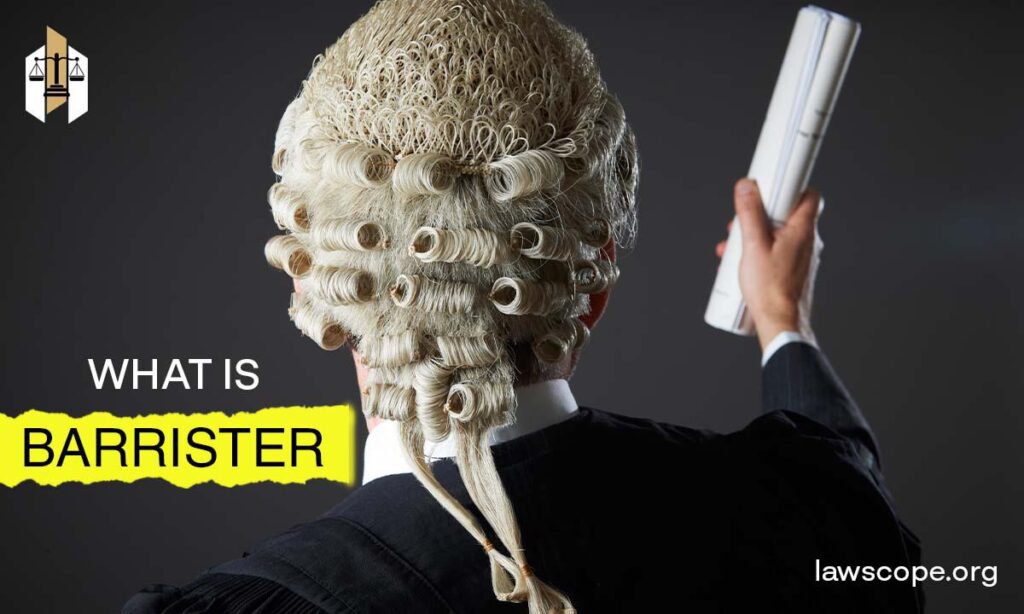
Have you ever wondered what is a Barrister? And what are its roles and responsibilities?
If yes then this blog is for you.
If you are in a legal profession then you must be aware of the term barrister.
Barristers are a vital part of the legal profession, playing a crucial role in the justice system.
However, for many people, their responsibilities and functions may remain a mystery.
In this article, we’ll delve into the world of barristers, offering insights into their roles, responsibilities, and the unique contributions they make to the legal field.
Defining a Barrister
What is a Barrister? A barrister is a legal professional specializing in courtroom advocacy and the provision of legal advice.
In many countries, including the United Kingdom and several Commonwealth nations, barristers operate within a two-tiered legal system, distinct from solicitors.
They are often referred to as “counsel” and are recognized by their distinctive courtroom attire, which includes a wig and gown.
Education and Training
Becoming a barrister is no small feat. It requires rigorous education and training, typically following these steps:
1. Undergraduate Degree: Prospective barristers usually begin with an undergraduate degree in law. This foundational education provides them with a solid understanding of legal principles.
2. Bar Professional Training Course (BPTC): After completing their undergraduate degree, aspiring barristers must undertake the BPTC, which is a one-year intensive vocational course. This program focuses on developing advocacy and courtroom skills.
3. Pupillage: Following the BPTC, aspiring barristers must secure a pupillage, which is a period of practical training under the guidance of an experienced barrister.
During pupillage, they gain real-world experience by assisting with cases and observing court proceedings.
4. Tenancy: Successful completion of pupillage may lead to tenancy, allowing the barrister to practice independently and accept clients.
Roles and Responsibilities of a Barrister
Now that we’ve established the educational journey of a barrister, and have answered what is a barrister. let’s explore their roles and responsibilities in the legal system:
1. Advocacy in Court
One of the primary roles of a barrister is to represent their clients in court. They present evidence, cross-examine witnesses, and make legal arguments on behalf of their clients.
Barristers’ courtroom expertise is crucial in ensuring that justice is served and that their clients’ interests are protected.
2. Legal Consultation and Advice
Barristers also provide legal advice to clients, solicitors, or other professionals. Clients often seek their expertise on matters that require specialized legal knowledge.
Barristers assess the legal merits of a case, offer guidance on potential outcomes, and help clients make informed decisions.
3. Legal Research
In addition to courtroom representation and advice, barristers conduct extensive legal research to build strong cases.
They delve into statutes, case law, and legal precedents to develop persuasive arguments and strategies for their clients.
4. Drafting Legal Documents
Barristers are skilled at drafting various legal documents, including pleadings, contracts, and legal opinions.
These documents play a crucial role in the legal process and often require precision and legal expertise.
5. Representation in Specialized Areas
Barristers often specialize in specific areas of law, such as criminal law, family law, commercial law, or human rights law.
Their specialization allows them to provide specialized representation to clients with complex legal issues.
6. Maintaining Professional Ethics
Barristers are bound by strict codes of professional ethics and conduct. They must uphold the highest standards of integrity, confidentiality, and fairness in their interactions with clients, colleagues, and the court.
Failing to adhere to these ethical standards can result in disciplinary actions.
7. Collaborating With Solicitor
In many legal systems, barristers work in conjunction with solicitors. Solicitors are responsible for initial client consultation, case preparation, and client representation outside the courtroom.
Barristers are typically engaged when a case reaches the litigation stage and requires courtroom advocacy.
Discover More:
Frequently Googled Questions About What is a Barrister
These frequently Googled questions and answers offer valuable insights into the role and responsibilities of barristers in the legal system.
Barristers are legal professionals with specialized expertise in advocacy, legal advice, and research, making them indispensable in ensuring justice is served and clients’ legal needs are met.
here are the top 5 frequently Googled questions about “What Is a Barrister? Unveiling the Role and Responsibilities,” along with comprehensive answers:
1. What is The Role of a Barrister in The Legal System?
A barrister’s primary role in the legal system is to provide advocacy in court.
They represent clients by presenting evidence, cross-examining witnesses, and making legal arguments. Barristers also offer legal advice, conduct research, and draft legal documents.
They play a crucial role in ensuring that justice is served and that their client’s interests are protected.
2. How Does One Become a Barrister?
Becoming a barrister typically involves several steps:
- Obtain an undergraduate degree in law.
- Complete the Bar Professional Training Course (BPTC), a one-year vocational program focusing on advocacy and courtroom skills.
- Secure a pupillage, which is practical training under an experienced barrister.
- After pupillage, barristers may gain tenancy and practice independently.
3. What is The Difference Between a Barrister and a Solicitor?
People often ask what is the difference between a barrister and a solicitor.
Barristers and solicitors are both legal professionals, but they have distinct roles. Barristers specialize in courtroom advocacy, legal representation, and providing specialized legal advice.
Solicitors, on the other hand, handle client consultations, and case preparation, and often engage barristers for courtroom representation when necessary. In many legal systems, they work together to provide comprehensive legal services.
4. Can Barristers Work in Different Areas of Law?
Yes, barristers often specialize in specific areas of law, such as criminal law, family law, commercial law, or human rights law.
Their specialization allows them to provide expert representation in their chosen field. Clients seek barristers with the relevant expertise to address their specific legal needs.
5. What Ethical Standards Do Barristers Follow?
Barristers are bound by strict codes of professional ethics and conduct. They must maintain the highest standards of integrity, confidentiality, and fairness in their interactions with clients, colleagues, and the court.
Ethical breaches can result in disciplinary actions, highlighting the importance of upholding these standards in the legal profession.
May You Like Also: Difference Between Lawyer and Attorney: Know The Difference
Conclusion
Barristers are legal professionals who play a vital role in the justice system.
They are experts in courtroom advocacy, legal consultation, and research, providing essential services to clients seeking justice.
Their specialized knowledge, rigorous training, and commitment to ethical standards make them indispensable in the legal field.
If you find yourself in need of legal representation, whether in a criminal trial, a civil dispute, or any other legal matter, consulting a barrister can be a wise choice.
Their expertise and dedication to upholding the law ensure that you have a skilled advocate fighting for your rights and interests in the courtroom.
You May Like Also:


7 thoughts on “What Is a Barrister? Unveiling The Role and Responsibilities”